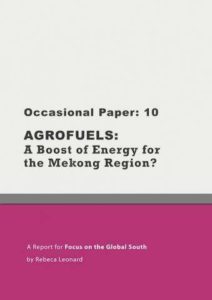28/07/2011
Under: Publications, The Commons
This background paper seeks to brief readers on the extent of the development, production and consumption of agrofuels, particularly liquid fuels for transport, in the Mekong region. The area of focus comprises the countries of the Mekong River Basin, that is, flowing downstream north to south, the southernmost prefectures of China (Yunnan and Guangxi), Lao PDR, Burma, Thailand, Cambodia and Vietnam. The varied political, economic, and social contexts of this region make it difficult to present general conclusions. Equally the many levels, aspects and questions concerning the development, impacts and ethics of the agrofuel industry in the region, can only be touched upon. Hopefully, however, the very different ways in which this sector has been developed in this region, may illustrate some instructive as well as the many cautionary lessons for farmers, their networks and other policy analysts working in the region.
This paper is based mainly on a desk study of publicly available literature. The section on community level renewable energy schemes was supplemented with interviews of key informants in Thailand. The first section covers the main features of the boom in agrofuel development in the Mekong Region, providing a contextual base and examining some of the impacts and critiques of the expansion of the ethanol and biodiesel industries. A note is made on some community level bio-energy initiatives and examines some of the challenges facing small-scale alternative fuel development. The final section presents a summary synthesising these findings and drawing together the different strands of analysis in the context of geopolitical developments in the region.




![[IN PHOTOS] In Defense of Human Rights and Dignity Movement (iDEFEND) Mobilization on the fourth State of the Nation Address (SONA) of Ferdinand Marcos, Jr.](https://focusweb.org/wp-content/uploads/2025/07/1-150x150.jpg)

